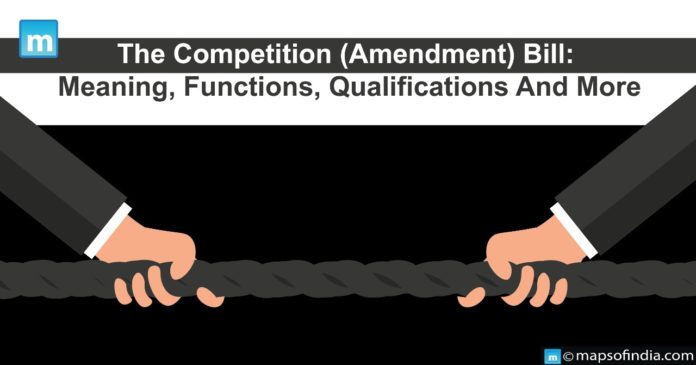Recently, the Lok Sabha passed the Competition (Amendment) Bill 2022 on August 5, 2022. It is further referred to the standing committee and will be discussed in the winter session of the parliament, and if the bill gets the majority of the votes, it will be converted into an act.
The main objective of this bill is to make changes to the previously established “The Competition Act” passed in 2002. Due to some issues, the Act took seven years to be implemented.
What is the Indian Competition Act?
The Indian competition is an act which was passed in 2002, but it came into practice after seven years. The Indian competition act established a “Competition Commission” whose main objective is to scrutinise all the practises that are illegal in the market.
The competition commission has also marked three anti-competitive practises common in the market. According to the Competition Commission, the anti-competitive issues in the market are:
- Abuse of dominance by more prosperous companies in the market
- Anti-competitive agreements between the parties
- Combinations are the merger of two companies without legal process, acquiring shares of another company, etc.
The function of the Competition Commission of India
The Competition Commission in India keeps an eye on the market and works according to the issues.
Main functions of the Competition Commission
- To protect the interests of consumer
- Make recommendations on issues concerning competition and illegal practices.
- Make sure that the freedom of the market is maintained.
- Encourage and inspire market competition.
- Keep an eye on and reduce all competition-related bad practices.
- The Competition Commission of India is also responsible for capacity building.
The Qualification of the Members of the Competition Commission
The previous Act, “The Indian Competition Act” stated that the chairman and members of the Competition Commission of India must have a professional experience of at least 15 years in the fields of Economics, Competition, Law, Management and Business
Reasons for the introduction of the Competition (Amendment) bill
- Established market
Since 2002, the overall background of the market has changed. The factors that changed the market are technological advancement, artificial intelligence, commodity price, etc. These amendments to the Act are required to remain competitive in the new age market.
- Traditional rules
The rules according to the current situation need to be changed. It was notified in the Indian Competition Act that any party engaging in mergers, acquisitions, or amalgamations has to inform the Competition Commission of India. The individual can only notify the Competition Commission of India based on the asset they possess.
- Combination guidelines
The previous Act prohibited individuals from entering into any combination, and as a result of this rule, market competition is directly affected. The new bill has allowed for combinations.
- Appointment of a General Director
According to the Act, the Central Government used to appoint the director general of the Competition Commission of India. Currently, the Competition Commission of India has taken over the power. The Competition Commission of India can appoint its director general with the government’s approval.




